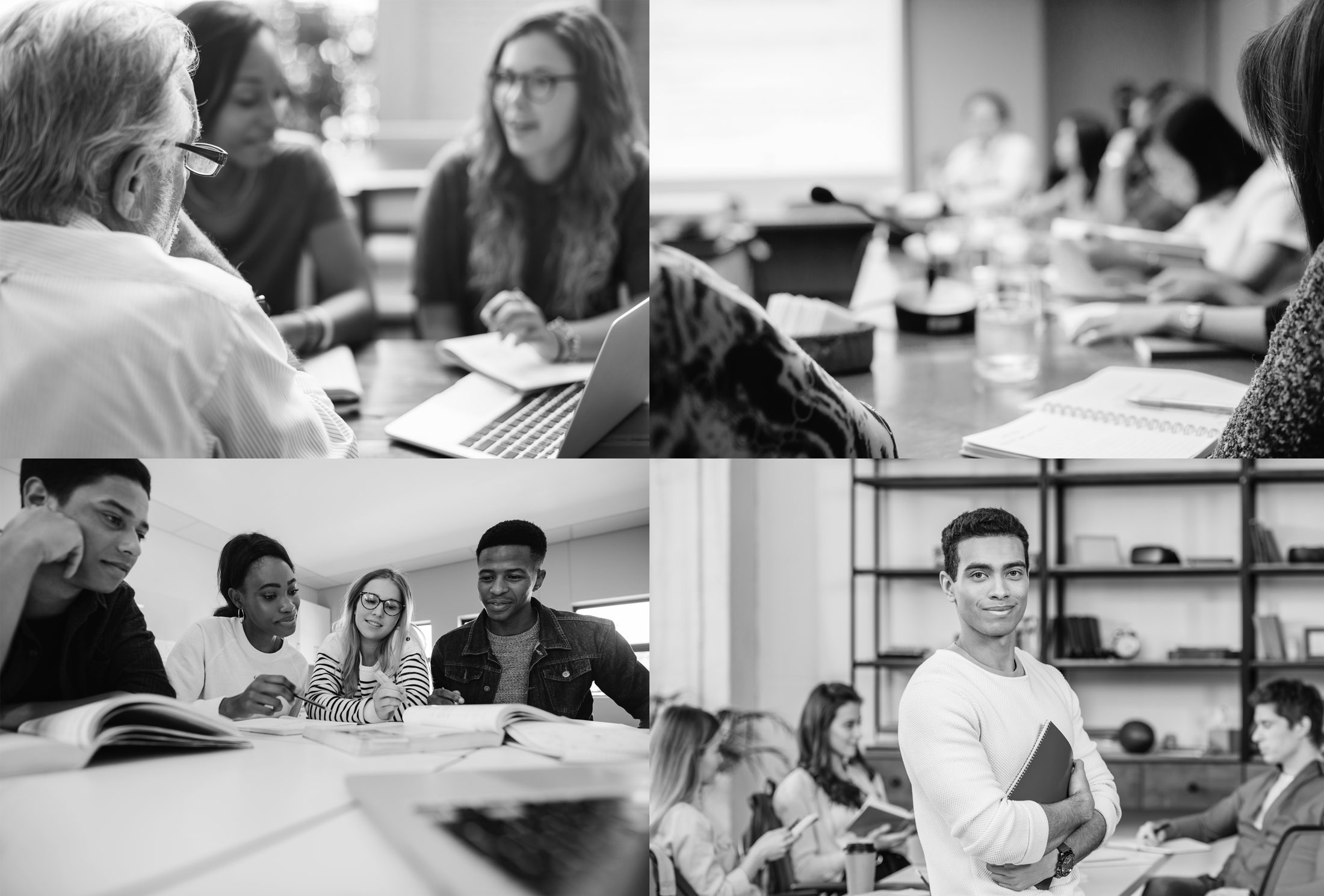Consortium of colleges and universities dedicated to professional development
The Faculty Collaborative
2026 Academic Year
The Faculty Collaborative (TFC) is a new consortium of colleges and universities dedicated to professional development and support. Its agenda is to identify the most pressing issues that confront faculty, explore best practices to address them, and provide expert training and support for their implementation. The Faculty Collaborative must cope with the reality of the continuing pandemic. As a result, our programs currently are virtual. In the future, The Faculty Collaborative will sponsor in-person activities along with virtual programs and confidential teaching consultations throughout the year.
During the Fall and Spring academic semesters, The Faculty Collaborative offers a virtual series of (1) FREE faculty development workshops, (2) FREE special disciplinary seminars, and (3) FREE individual confidential teaching consultations for faculty members at participating TFC member institutions. (See past programs below.)
Workshops
Previous workshops have explored a wide range of topics from Motivating Student Learning, Time Management for Busy Academics, to Writing a Book Proposal and Securing a Publishing Contract. Recent workshop leaders have included Dr. Robert DiYanni, a professor of humanities at New York University (NYU) and a former instructional consultant for the NYU Center for the Advancement of Teaching and Dr. Mary Deane Sorcinelli, Professor Emeritus and Senior Fellow, Center for Teaching and Learning, University of Massachusetts, Amherst. (See past programs below.)
Teaching Consultations
During the Fall and Spring semesters, Professors DiYanni and Sorcinelli also will be available for individual consultations on aspects of teaching and related professional growth to be determined by individuals who sign up for the service. These half-hour consultations, conducted via Zoom, are meant to help teachers respond effectively to challenges faced as they teach and develop their careers. Topics will be determined by participating faculty members. Consultations will be offered on a rolling basis from late September through early November.
Special Disciplinary Programs
In Spring 2022, TFC introduced special disciplinary programs that were convened by eminent scholars in their fields. (See past programs below.)
On Pause
TFC
2026 Academic Year
During the 2026 academic year, The Faculty Collaborative programs will be on pause to provide time for reflection, evaluation, and planning. Please check back for further news.
—With gratitude, The TFC Team
Contact Us
Past Programs
Summer 2023 Programs
Practicing Critical & Creative Thinking
with Robert DiYanni, New York University
In this three-day seminar, we explored a series of provocations to higher-order thinking, both critical and creative. The goal of each session was, first, for participants themselves to experience different thinking strategies, and, second, to consider how to help their students apply those strategies to improve their critical and creative thinking.
The seminar, though based on research and professional practice in a range of disciplines, did not include discussions of theory. Nor did it linked directly with any particular academic or professional discipline. Instead, participants were engaged with the seminar leader in a series of classroom-tested, hands-on thinking exercises across a range of approaches to thinking that can be applied across disciplines. These approaches included parallel and lateral thinking, visual and metaphorical thinking, design thinking, and decision thinking—among others.
Each of the three-hour seminar sessions was self-contained, thus allowing participants to attend anywhere from a single session to the full suite of three sessions. The seminar was interactive and discussion-based. Readings from the list of recommended books referenced throughout the seminar sessions, but need not be read in advance. Chapters from some of the recommended books were provided as word documents and pdfs, either during or after each session.
Certificates indicating participation in individual seminar sessions were provided, as well as a certificate for completing the full seminar.
Seminar Schedule
Day One
- Introductions
- What is higher order thinking? Who exemplifies higher order thinking?
- Parables as Provocations
- Going Meta: Parables + / Discussion
- Why Put Critical and Creative Thinking Together? Daniel Pink and Sir Ken Robinson et al. (SLIDES and Talk) + Discussion
- Six Thinking Hats—Edward de Bono
Day Two
- Edward de Bono: Lateral Thinking / Random Word
- Thinking Through Visuals: Shapes / Images
- Design Thinking: Principles and Paradoxes (Numbers / Graphs et al)
- Thinking about Language: Hayakawa / Metaphor and Connotation
Day Three
- Creative Thinking: Roger Von Oech, Creative Whacks
- Creative Thinking: Michael Michalko, Thinkertoys
- Decision Thinking, from Critical and Creative Thinking, Robert DiYanni
- Think Again, Adam Grant
Spring 2023 Programs
- Engaging Students in Learning: Effective Teaching Practices With Robert DiYanni
- Publishing Your Book: An Introductory Overview With Robert DiYanni
- A Multivoice, Multidisciplinary Approach to Enhance Students’ Worldviews and Academic Outcomes With Kassie Freeman
- Working in the New Normal — The Cyber Threat Landscape With Ed Moskal
- Updating/Constructing Your Syllabus With Michael Dinwiddie
- Gender and Sexuality in Film and the Mass Media With William Luhr
- The Professoriate and the First Amendment: A Threatened Relationship With Audrey Wolfson Latourette, M.A., J.D., Distinguished Professor of Public Law
Winter 2023: JANUARY WRITING BOOT CAMP With Mary Deane Sorcinelli
Writing can feel very solitary, but it doesn’t have to be. The Writing Boot Camp is a virtual writing group that can provide you with an invaluable source of motivation, community, and accountability. It offers dedicated time and facilitated support to work on a project, whether it is a manuscript, a course, or other types of writing. Each Friday in January 2023, we will meet online for one hour. We will begin with 10 minutes of introductions, check-ins, and goal setting for the session. For the next 40 minutes you will turn off your microphone and video to allow for focused time on your own writing. In the final 10 minutes, we will conclude with reflections about progress on individual writing and goals for the upcoming week.
The Writing Boot Camp is intended for up to 12 faculty who can commit to a one-hour, once-a-week writing group on January 6, 13, 20 and 27. The ideal is to keep the writing group as part of your schedule even if you might be unable to attend the entire session every week (e.g., over the month, you might have arrive a bit late or leave early on occasion). As a participant, you will benefit from scheduling time for your own scholarly writing and developing new connections with other academic writers.
Fall 2022 Workshops With Robert DiYanni
- The Habit of Writing
- Revising Your Writing
- Effective Discussion-based Teaching
- Making Learning Last
Fall 2022 Special Disciplinary Programs
Teaching about Climate Change, Solutions and Justice With David Blockstein, Eban Goodstein, Margaret Wang, and Natalie Marsh
- #makeclimateaclass: Teaching About Climate Change in All Disciplines
- Helping Your Students to Combat Climate Despair
- Subjecttoclimate: a Toolkit for Introductory Higher Education and Secondary Education
- Engaging With Your Museum or Gallery in Climate Education
Fall 2022 Workshop With Margarita Benitez
- Becoming a Leader
Fall 2022 Workshop With Audrey Wolfson Latourette
- Plagiarism: Legal And Ethical Implications For The University
Summer 2022 Workshop With Beverly and Bob Kahn
- How to Write Competitive Grant Proposals
Summer 2022 Workshops With Robert DiYanni
- Practicing Critical & Creative Thinking (Three-day Seminar)
Each of the two-hour seminar sessions was self-contained, thus allowing participants to attend anywhere from a single session to the full suite of six sessions—and any number in between.
Day One
Morning:
- Introductions
- What is higher order thinking? Who exemplifies higher order thinking?
- Parables as Provocations
- Going Meta: Parables + / Discussion
Afternoon:
- Why Use and Teach Critical and Creative Thinking Together? Daniel Pink and Sir Ken Robinson
- Parallel Thinking: Six Thinking Hats—Edward de Bono—Application of the hats approach
Day Two
Morning:
- Lateral Thinking: Edward de Bono—Random word exercise
- Thinking With and Through Visuals—Exercises
Afternoon:
- Design Thinking: Principles, Paradoxes & More, Pearson Guide to Thinking, DiYanni
- Thinking about Language: Hayakawa—Connotation and Metaphor, Exercises
Day Three
Morning:
- Creative Thinking I: Roger Von Oech, Creative Whacks and Kicks—Exercises
- Creative Thinking II: Michael Michalko, Thinkertoys & Creative Thinkering—Exercises
Afternoon:
- Decision Thinking: Critical and Creative Thinking, Chapter 6, DiYanni
- Ethics and Thinking: Critical & Creative Thinking, Chapter 5, DiYanni
Spring 2022 Workshops With Robert DiYanni
- Making Learning Last
- Assessment & Grading
- Technology and Teaching
- Writing a Book Proposal and Securing a Publishing Contract
Spring 2022 Workshop With Mary Deane Sorcinelli
- Time Management for Busy Academics
Spring 2022 Special Disciplinary Programs With Michael Dinwiddie
- Castoff Treasures: the Artist/scholar Model in the 21st Century
Scholars share knowledge and explore new ways of thinking through books, articles, lectures, and monographs. Artists likewise illuminate pathways into our humanity with the visual and performing arts. What is the artist/scholar model and where was it developed? Is such a configuration necessary in modern society? What is lost or gained with a bifurcation of these roles? And, how does the artist/scholar model help us discern value and worth in social action and activism? As found objects are reshaped through scholarship and artistic practice, they become treasured works that provide a rich palimpsest for future generations to discover. Featured readings examined the castoff roots of such disparate creators as the Gee Bend Quilters, painter John Singer Sargent, photographer Deb Willis, sculptor Richard Howard Hunt, and singer Lauryn Hill, among others.
Spring 2022 Special Disciplinary Programs With Ali Banuazizi and Thomas Barfield
- Afghanistan: the Land, the People, and the Refugee Crisis
This seminar served as a review and analysis of the last five decades of instability in Afghanistan. It also brought to light the pressing needs of the tens-of-thousands of young Afghans who have been given refuge in the United States and explore ways that TFC institutions can welcome, accommodate, and provide educational opportunities for certain members of these refugee groups.
The first sessions devoted to a brief overview of Afghan history and politics, with a focus on the turbulent decades since the Saur revolution of 1978, including the Soviet invasion and occupation of the country (1979-89), the rise of the Taliban and their first period of rule (early 1990s to 2001), and the twenty-year war and state-building efforts by the U.S. and its Western allies (2001-2021). The destructive impact of these events on the lives and livelihood of ordinary Afghans, the bloody inter-ethnic and sectarian conflicts which they generated or intensified, and the massive flight of millions of Afghans to neighboring countries as refugees will be discussed. Included in this overview accounts of the expanded educational opportunities (particularly for young women) and chances for various kinds of civic engagements, entrepreneurial activities, and employment that developed in Kabul and other major urban centers during these same tumultuous years.
The second session of the seminar focused on the consequences of the precipitous U.S. withdrawal from Afghanistan and the collapse of its central government in August, 2021, and the fate of tens-of-thousands who were lifted out of the country in the final days of that withdrawal and many other politically vulnerable individuals and families who were left behind in desperation. More specifically, the current efforts by the U.S. government, aid agencies, and private groups to settle these refugees (for which the U.S. Congress has allocated over seven billion dollars) will be discussed in detail. The overriding goal of the session pursued in the give-and-takes among the participants and the TFC coordinators exploring ways in which academic institutions—with potential financial support by the government, aid agencies, and philanthropic groups—can accommodate and provide educational opportunities for the younger members of these refugee groups in their respective communities. We should note that efforts similar to the one proposed here are being made by various other groups (most notably U.S. veterans who served in Afghanistan), a recently-formed consortium of universities, and several private philanthropic organizations.
Fall 2021 Workshops With Robert DiYanni
- Motivating Student Learning
- Discussion-based Teaching
- Publishing Your Book: an Overview
- Writing & Learning
Fall 2021 Faculty Focus Groups Convened by Mary Deane Sorcinelli
- Four Faculty Forums

